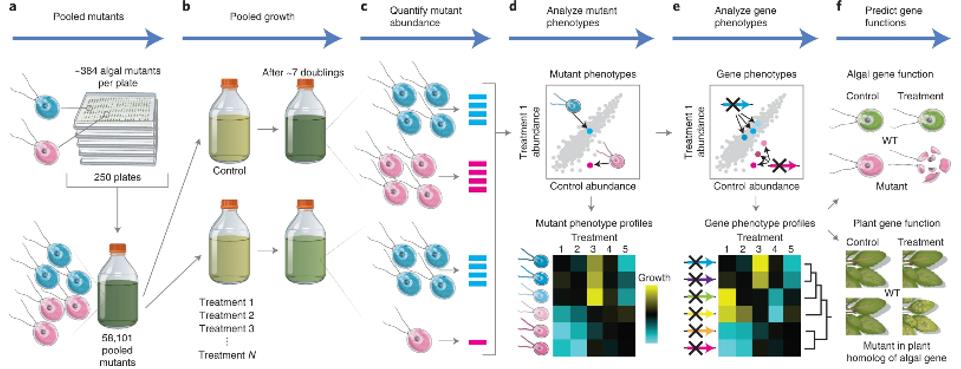Reverse Genetic Screening Service for Algae
By establishing a barcoded mutated algae library, the phenotypes of these mutants are studied on a large scale under a variety of different environmental growth conditions and chemical treatments to find phenotypes that are controlled by specific gene sequences
With years of experience in algae research, Lifeasible has built up a large library of strain mutants and a mature platform for algae analysis and is capable of providing high-quality and efficient reverse genetic screening services for algae.
Introduction to Reverse Genetic Screening
Reverse genetics screening focuses on genes. A library of mutant algae is constructed to map the relationship between genotype and phenotype and further predicts gene function. Established automated methods for rapid analysis of thousands of mutants (called high-throughput methods) are often used to study genome-wide gene function in model systems such as yeast and bacteria. As a common tool for studying gene function, mutations in algae have been constructed into mutation libraries for studying the role of algal genes in photosynthesis, DNA damage response, and heat stress response, as well as reactions to toxic chemicals and algal predators.
Workflow of Reverse Genetic Screening
To link genotype to phenotype, firstly, a database of algal mutants targeting a particular gene needs to be constructed, and the phenotypes of mutant algae are analyzed by varying growth conditions, including at different photon flux densities, and CO2 concentrations, as well as various abiotic stress conditions such as pH, temperature, and chemical stress. The correspondence between the genotype and phenotype of the mutants is used to predict the potential function of the gene.
 Fig.1 Workflow for the study of genotypes and phenotypes of large-scale algae. (Fauser, F., et al., 2022, Nature genetics)
Fig.1 Workflow for the study of genotypes and phenotypes of large-scale algae. (Fauser, F., et al., 2022, Nature genetics)
Potential Applications of Reverse Genetic Screeing
Discovery of New Gene Functions in Algae - Through phenotypic analysis of mutant algae, the functions of genes in algal growth and metabolism, such as DNA repair, photosynthesis, CO2-concentrating mechanism, and ciliogenesis, are unraveled.
Discovery of New Commercial Algae - With the interpretation of algae genes, genetically engineered algae on a specific functional site in the genome can be effectively exploited to produce food, biofuel, biomaterials, and medicines.
Promoting Research in the Field of Plants - Many of the gene functions found in algae are also conserved in plants. Research on algal genes can be used to modify plants to be more tolerant of heat or cold stress, temperature stress, or to improve photosynthesis.
Our Services
As a well-established CRO, Lifeasible has advanced equipment, libraries of mutant algae, and platforms for the analysis of algal phenotypes to provide quality reverse genetic screening services for algae.
- Automated Equipment
Automated passaging instruments can increase the speed of research on algae and the reliability of analysis results. - Existing Algal Mutation Library
Genome-wide libraries of mutant Chlamydomonas reinhardtii are used in the function discovery services. In addition, we also have professional teams undertaking the development of mutant libraries for other algae species. - Multiple Genetic Tools
Multiple Tools can be used to conduct reverse genetic screening, such as RNAi and CRISPR/Cas9. - Phenotype Research Platform
Multiple types of parameters are applied to the phenotypic analysis platform, including the control of growth conditions and chemical stressors.
Why Choose Us

With years of algae research experience, Lifeasible has accumulated a wealth of acknowledgment and are capable to provide professional reverse genetic screening services for algae for our clients. Please contact us for more information.
Reference
- Fauser, F., Vilarrasa-Blasi, J., Onishi, M., Ramundo, S., Patena, W., Millican, M., Osaki, J., Philp, C., Nemeth, M., Salomé, P. A., Li, X., Wakao, S., Kim, R. G., Kaye, Y., Grossman, A. R., Niyogi, K. K., Merchant, S. S., Cutler, S. R., Walter, P., Dinneny, J. R., … Jinkerson, R. E. (2022). Systematic characterization of gene function in the photosynthetic alga Chlamydomonas reinhardtii. Nature genetics, 54(5), 705–714.
Our services are for research use only and not for any clinical use.